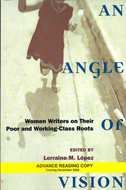An Angle of Vision
Few aspects of personal experience are taboo any longer, but Lorraine López has collected a set of essays in this anthology that address an emerging topic of national conversation: what does it mean to grow up poor? In our current cultural moment, when the availability of health care for all Americans is being negotiated, the concerns of this collection are particularly sage.
Few aspects of personal experience are taboo any longer, but Lorraine López has collected a set of essays in this anthology that address an emerging topic of national conversation: what does it mean to grow up poor? In our current cultural moment, when the availability of health care for all Americans is being negotiated, the concerns of this collection are particularly sage.
An Angle of Vision: Women Writers on Their Poor and Working-Class Roots gathers prose from eighteen women reflecting on the transition they have each made from lives of struggle into successful careers in the arts. In particular, Amelia Maria De La Luz Montes’s “Queen for a Day” and Bich Minh Nguyen’s “Laverne & Shirley Days” directly address the evolving role of popular culture in each writer’s life.
Nguyen writes about the desire of the men in her family for large electronics, with special focus on acquiring an expensive television. She describes their triumphant upgrade from a black and white model to “a gorgeous behemoth encased solidly in oak,” an item that represents success for her family. In college, Nguyen learned through observation that a TV set would no longer be an appropriate “mode of assimilation” for her; upon entering into higher education, a sea change had occurred. “Not to have a television,” Nguyen writes, “not to need a television, was to know real privilege.”
Readers male and female alike will value the often brutal honesty of the essays in this collection, which is packed with faux pas and gaffes, epiphanies both victorious and discouraging. As Joy Castro writes in her contribution, “Jumping class comes at a price, and the price is not belonging.” This book illustrates many strategies for understanding the seldom discussed movement between the working-class and academia – the opportunity to read this book is one such strategy.




